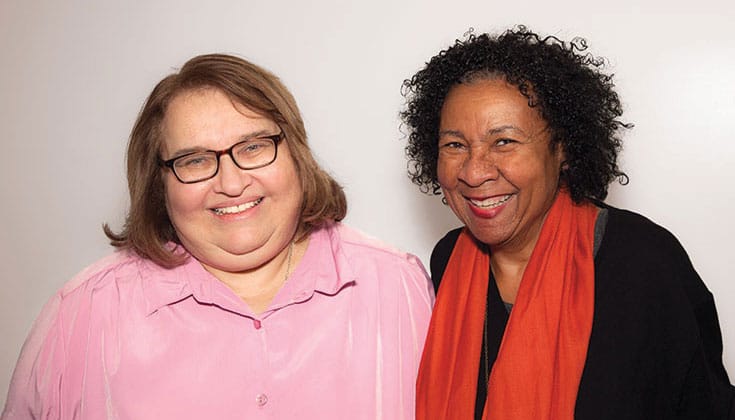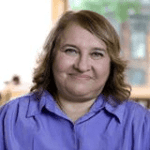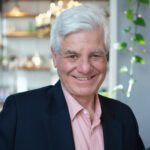If love is what we need more of—and we do—then Sharon Salzberg and bell hooks are two of the most important voices of our time. As a leading teacher of loving-kindness meditation, Sharon Salzberg answers the all-important question: how, precisely, do we bring more love into our lives? As one of America’s leading political and cultural critics, bell hooks advocates for the power of love to transform not only our lives, but our society, overturning the culture of domination. I was honored to join these two great women and champions of love to celebrate the publication of Salzberg’s new book, Real Love: The Art of Mindful Connection, in a discussion at the Jewish Community Centre in New York co-sponsored by Lion’s Roar, the Garrison Institute, and the JCC. —Melvin McLeod
Melvin McLeod: We all want to be loved. We all want to love. But many of us are baffled about how to actually bring more love into our lives. How can we start?
bell hooks: Something I deeply appreciate about Sharon’s teaching—particularly in her new book, which is a kind of love workbook—is that she explores what we need to do to carry on the work of love. It fascinates me that while we are so obsessed with romance, many of us are turned off by the practice of love.
When you tell someone that there’s really a practice—a way that many of us, especially those from dysfunctional backgrounds, can learn what it is to love—they are hesitant to fully accept that. Sharon, when you express your conviction in our innate capacity to love, I’m not sure many people really believe in that.
Sharon Salzberg: Well, why would we, really? [laughter]
There’s a line from an old Steve Carell movie, Dan in Real Life: “Love is not a feeling. It’s an ability.” I wanted to use that line in my book Real Love, but my editor pushed back, saying I couldn’t really say that because people think of love as a feeling. So I sort of fudged it and wrote, “While we might think of love as a feeling, we can also think of it as an ability.” That turned out to be the most important line in the book. It describes the essence of a transformative experience I had a long time ago.
Love is inside me. Other people might awaken it or threaten it, but as a capacity, it’s mine.
In 1985, I was in Burma practicing intensive loving-kindness meditation. I had been there three months when I had a realization. I saw that up until then, I had considered love something that was in someone else’s hands. They were either going to deliver it to me or take it away. It was as if the UPS person arrived with a package of love, but if they got to my doorstep and decided they had the wrong address, I would have no love in my life.
In that retreat, I realized that was not true. Love is inside me. Other people might awaken it or threaten it, but as a capacity, it’s mine. That was incredibly liberating and also a little daunting. Because—and here’s the big question—if it’s an ability, does that mean it’s my responsibility to try to cultivate it, even in difficult circumstances?
bell hooks: Anytime we do the work of love, we are doing the work of ending domination. In a culture of domination, it’s extremely hard to cultivate love or to be love. At this moment in our nation, there’s so much disrespect afloat. Respect comes from a word meaning to look at. Right now, we are not looking at one another with loving-kindness, with compassion.
As Sharon teaches, you have to practice love not just for the people you like, those who are near you. You have to practice it for everyone. In Appalachia, where I live, I see an upsurge of white supremacy. Prior to this, I felt I was taking to heart the Buddhist emphasis on practicing love. I felt I could walk around Appalachia and beam love to white people. Maybe they wouldn’t respond or they would turn away, but I did not feel fear.
These days, I feel fear and uncertainty in my relationship to strangers. So I struggle every day now with how to love the stranger. How do I love people who are beaming a lot of hate in my direction? That’s a really crucial national question right now. How can we return ourselves to a place of loving-kindness?
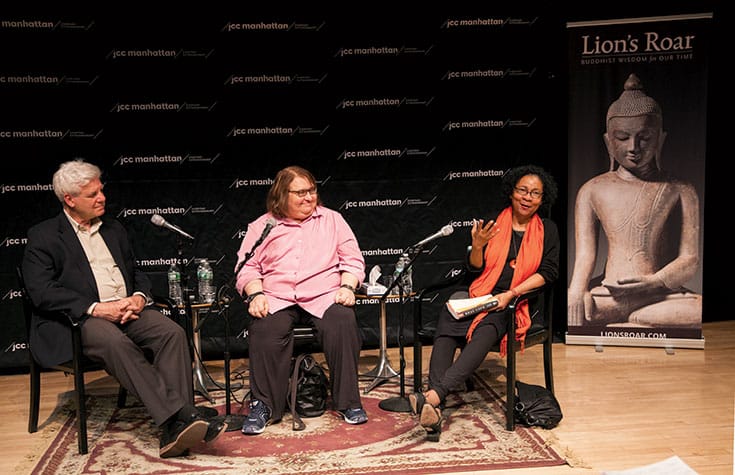
Sharon Salzberg: Normally, we don’t want to love someone we’re in an adverse relationship with. We may feel it means giving in, surrendering, or giving up our values. But real love means loving them too.
An indelible image that has stuck in my mind is of the freedom riders registering people to vote in the South in the 1960s. One civil rights activist who had been badly beaten was being interviewed in the hospital, and he was radiant. Asked why, he said, “We practice nonviolence.”
Where did that come from? I’d have a hard time generating that kind of radiance for a bad cab driver. That shows us what’s possible when we don’t see love as being weak or giving in, but as courageous. If we see love as touching something much greater than our own situation, then it becomes a wellspring of strength.
Over the years that I’ve taught loving-kindness, I’ve encountered many people who are skeptical about the whole thing. “If I were to develop a more loving heart,” they think, “I’d have to give more money, I wouldn’t take a stand, I wouldn’t protect myself, I’d just sort of smile.”
If we think that’s what love means, what a degraded notion of love we’ve come to! There’s something empowering in recapturing the word “love” as something strong and unafraid.
bell hooks: That’s part of the power of Martin Luther King Jr. that we’ve kind of lost. He talked about love as a transformational source. It’s come down to us as a sort of a watered-down version of “Love your neighbor as yourself,” not as an empowering force that changes everything. I love Dr. King’s book Strength to Love, in which he talks about the courage it takes, in the midst of domination, to decide to love.
Breaking down that us-and-them binary is part of the work of love.
That’s a commitment many of us would rather not deal with. How do we make that commitment? How do we start to love? We’re in such a climate of hate right now. We’re seeing diminishing acts of kindness and love because fear of the stranger has been so deeply cultivated in us. Breaking down that us-and-them binary is part of the work of love. We need to challenge all the binaries we face and try to see where to find a relationship with the “other”—the one we fear—so that we can enact compassion.
Melvin McLeod: Love is a word with so many different meanings and interpretations. How do you define it?
bell hooks: Love is mostly about the action, not the definition. Drawing on Erich Fromm, I see love as a combination of six ingredients: care, commitment, knowledge, responsibility, respect, and trust. They form a basis for action. It’s not about what you’re feeling or how you’re defining love. The real question is: what is the action you’re taking?
Melvin McLeod: In Real Love, Sharon, you remind us how self-doubt and inner criticism can hold us back from loving. As we make the effort to cultivate more love, is it also helpful for us to recognize and celebrate how much we love and care already? Rather than continually questioning our capacity to love, are we challenged to see how our inherent capacity to love is constantly in action already?
bell hooks: Is it constantly in action, or is it something we have to activate? Our innate capacity to love is like a seed in the soil. What do we need to do to activate that seed, to make it capable of blossoming? It’s not enough just to know that the seed is in the soil.
Sharon Salzberg: Yes. Without our effort, it will not grow and spread. But I agree that we have unguarded moments of profound connection and they’re not strategic. They don’t even have to be with a human being or fall within the standard picture of a relationship. We can love life or nature. We can be struck with gratitude and awe, have great moments of connection, without another person involved.
It’s true we can be harsh judges of others and of ourselves. We always need to look at both the stories others tell about us and the stories we tell ourselves. Part of what makes us feel incomplete is not noticing that we are loving people, that we have great capacity to love. Love is not a scarce resource.
bell hooks: This takes me to the one place in Sharon’s book that raised a question for me: where you say you don’t have to be completely self-loving to love others. I have my doubts.
I make a distinction between care and love. I received care in my dysfunctional family and I’m here today because of it. Even if you receive care Monday through Friday and abuse on Saturday, it doesn’t negate the fact that you experienced care. But it’s not love. I believe we can wholeheartedly care for others without loving ourselves. But I don’t know that we can love them.
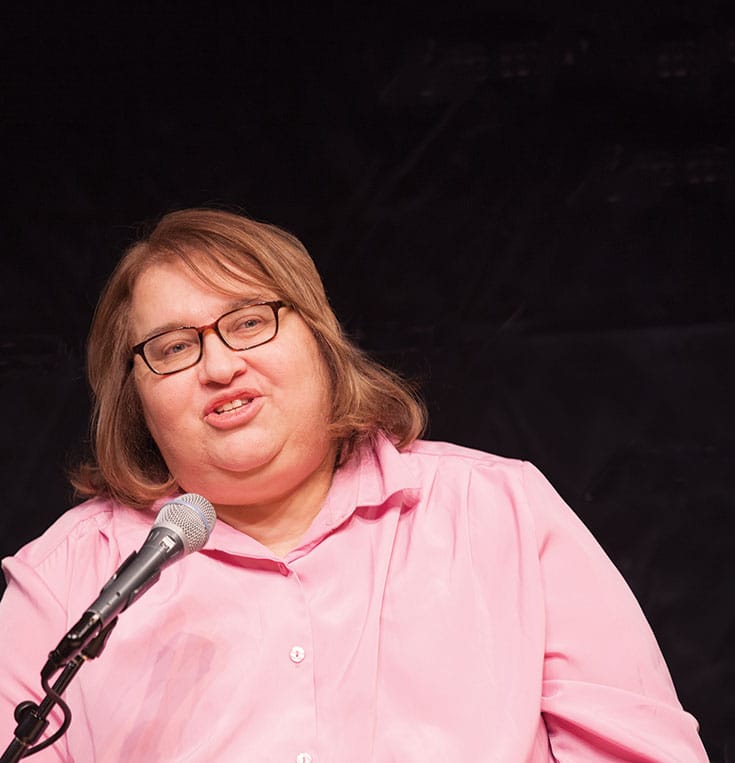
Sharon Salzberg: That’s a good point. As you’ve been speaking, I’ve been thinking that the missing ingredient in the six elements of love you listed is love for oneself. If you give love to others without loving yourself, you’ll be out of balance. You won’t find wholeness.
On the other hand, I don’t think loving yourself one hundred percent should become the project before you ever work on loving somebody else. People say that to me all the time: I decided to spend a few years only offering loving-kindness to myself. I understand and respect the impulse, but the question is, how do you know when you’re done? What’s the measure you’re looking for?
bell hooks: It’s not necessary to get to the point of being able to say I completely love myself. But I do think we must come to that place of wholeness where we are at peace, especially those of us who have unresolved trauma. When you have wholeness and peace, it makes you want to love more. As you say, Sharon, people start off thinking they could never love that much—it’s too daunting. Or they don’t want to, because it would make them too vulnerable. But the more you practice love, the easier it is. It becomes an act of grace.
Question from the audience: How do you find the strength to love the other? How do you stop seeing someone as the “other” when they are obviously othering you?
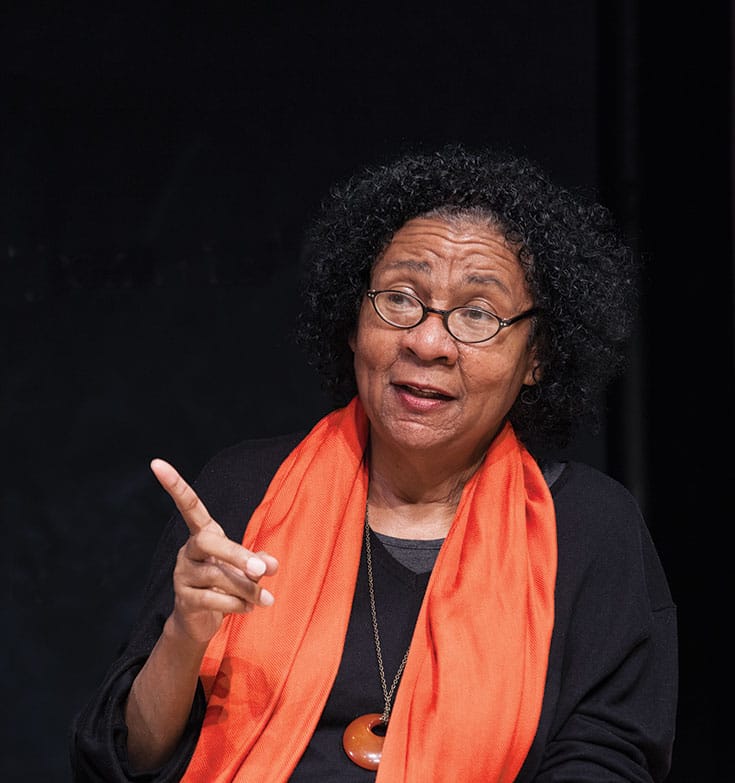
bell hooks: The practice of compassion is a profound practice of finding space. Can I find a space I can enter with this person who clearly others me, who wants to deny me my humanity? That’s one of the key roles of meditation—finding a space where I have the strength to not be shriveled up by an act of aggression I encounter.
As Black people and Brown people, we encounter so much everyday aggression. What may seem like a trivial incident can do real damage, and we end up carrying it around. For me, the alchemical process of meditating, of reflection, allows me not to carry things with me that can paralyze and wound me. Self-care strengthens our capacity to enter into this culture of domination and othering without being constantly wounded.
Sharon Salzberg: You’ve already done the hardest part, because you want to reach out to the other. You don’t see that as weak or being in collusion with the other’s destructive view.
That’s strength already. That’s your innate dignity coming through. It enables you to look at how that person is “shriveled up,” in bell’s words. You can see the self-imposed prisons they live in, how the choices they’ve made have cut them off. Compassion can flow from that.
Question from the audience: Love was a radical notion to my mother. I realized early that she didn’t know how to love herself, and that meant it was hard for her to love me. I wasn’t shown what it means to love; I was shown what it means not to love. How can I learn through meditation and other practices to connect to what it means to love from a positive perspective?
Sharon Salzberg: There can be something beneficial that can come out of learning through negation. When you get to see up close what doesn’t work, you can also see what’s left, and you may find something really potent.
As far as meditation practice goes, the proof is usually in doing it. If you’re the kind of person who’s really helped by structure, I would suggest trying a structure that seems reasonable to you. Don’t make it too ambitious, and then give it a shot. If you’re just starting out, try something like ten minutes a day.
One thing I’ve learned from my own meditation and from teaching others is that while you may think you’re getting nowhere with meditation—I still get so sleepy, I’m so bored, I’m not getting an ecstatic charge out of this—change does happen in your life. You might look in vain for the change during that ten-minute period each day, but not notice that when you made a big mistake, you didn’t beat yourself up quite so much. Or you met a stranger and really paid attention to them instead of being self-absorbed. Or a conflict arose and you didn’t treat it with the same desperation. That’s how meditation can help more love seep into your life.
Question from the audience: I run an organization where I work 24/7 to help others. But I also have a lot of anger. It feels like in the face of hatred, revenge is good. Others are now saying, as they did back in the sixties, “Get down, put your head down, and let people spit on you.” At the time I said, “I’m not going on those marches. Nobody is gonna spit on me without me spitting back,” and I still feel pretty much the same way now. So where does somebody like me go with that? How can I find a way to be authentic within all this?
bell hooks: We like to think that revenge is satisfying, but there are so many stories in which people discover that revenge isn’t satisfying. It didn’t take away the weight they were carrying with their rage. That’s why we offer love, because it can deal with that rage and offer us ways to move beyond vengeful feelings.
As Black people in the diaspora, we use anger as a way of cutting through invisibility. If we become enraged, if we strike out, we feel like we are seen, that we are exercising a form of power. It’s possible, though, to look to other forms of power we can lay claim to, that we can use.
On the other hand, trying to contain rage, tamping it down, doesn’t work either. We get sick because we can’t engage in the healing self-care that has to happen for us to blossom.
Sharon Salzberg: If somebody spit at me, I hope I would say or do something that says, “You have no right to treat me that way. I deserve better.” I don’t see “I deserve better” as vengeful.
Audience member: That’s why I’m talking about authenticity. I want to come from a place where I really don’t want to spit back. I have learned that I have enough love for a person who spits on me that I will not spit back, or hit back, or bite back. I really, really feel that that’s not the right thing to do. If I learn that, that’s authenticity.
